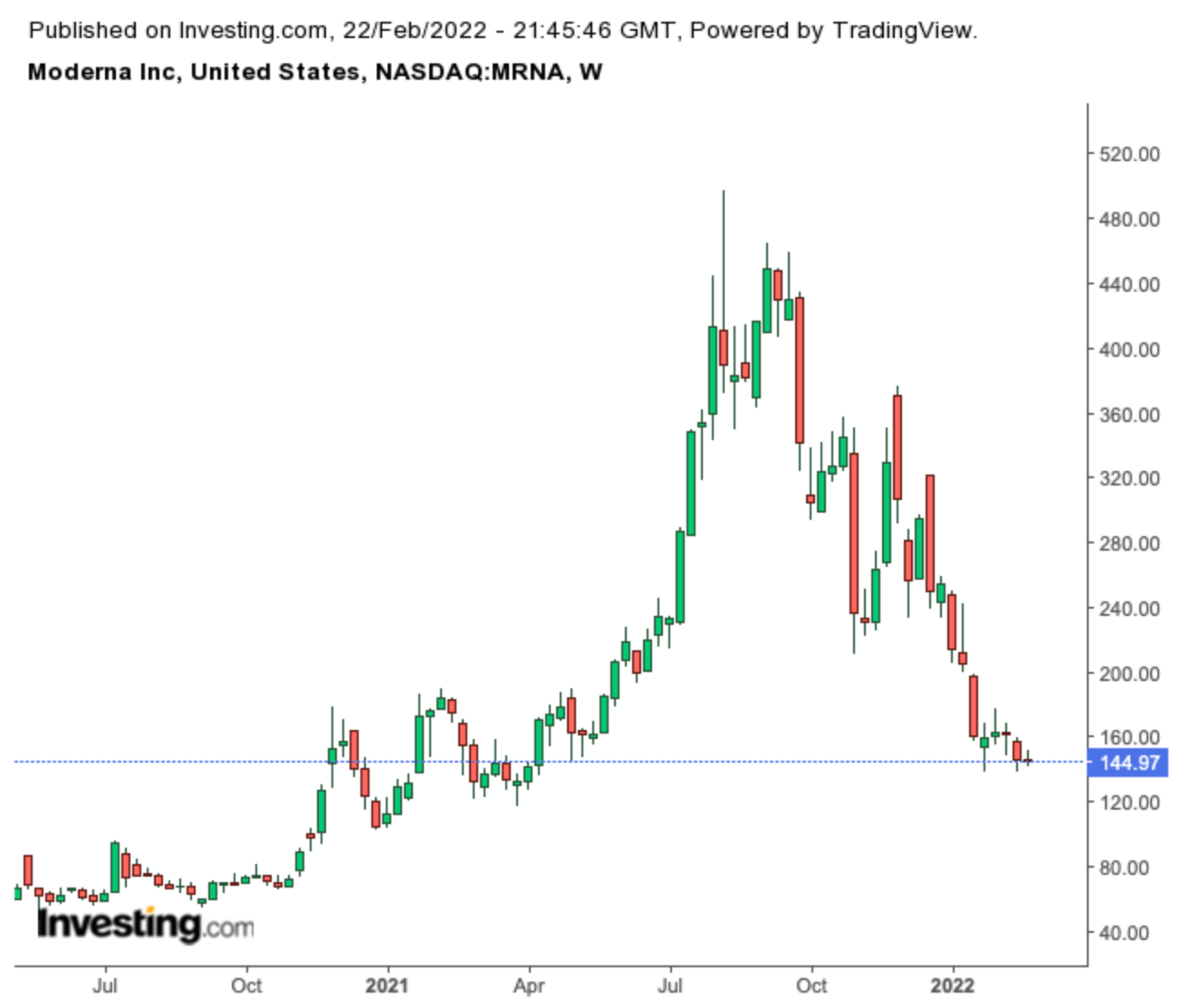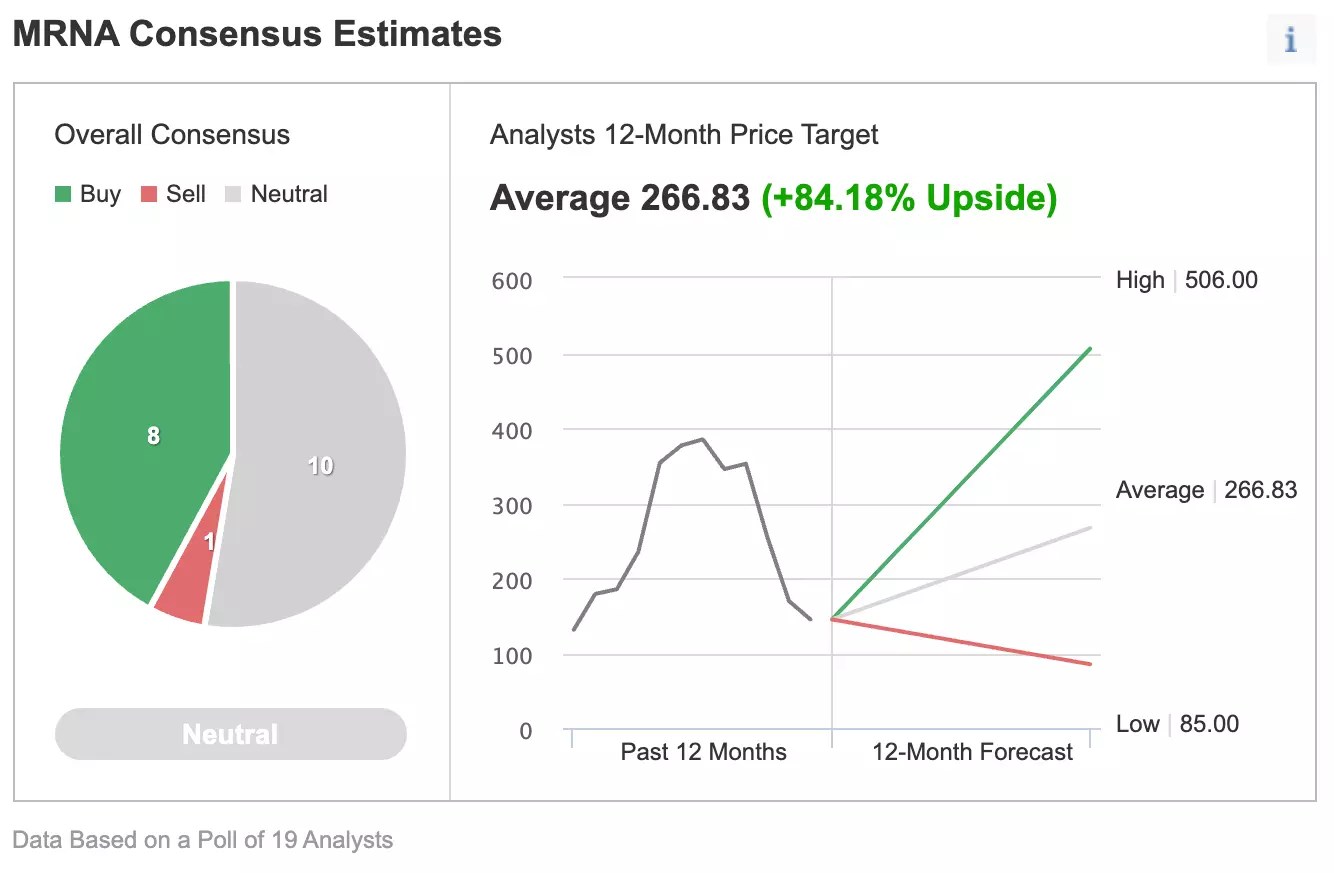Among pandemic-era stocks, Moderna (NASDAQ:MRNA) may undoubtedly be one of the most extraordinary. Since 2020, the Cambridge, Massachusetts-based COVID-19 vaccine producer gained 680%, an impressive rally for its shares which vastly outperformed the competition.
However, since the start of 2022, the biotech company’s stock has tumbled more than 42% amid the broad market selloff in growth equities and signs that governments might be moving to end pandemic restrictions. Moderna closed Tuesday at $144.97.
 Moderna Weekly Chart
Moderna Weekly Chart
Earlier this week, Britain announced it planned to end pandemic restrictions, becoming the first major Western government to do so. People with COVID-19 will no longer have to self-isolate from Thursday, while access to free tests will end on April 1. These changes are subject to a vote in Parliament.
In this context, it’s unclear how much more growth coronavirus vaccine producers can expect when many countries quickly shift their tactics to deal with the disease.
Furthermore, Moderna missed analysts’ expectations in the third quarter when it reported $4.97 billion in revenue. The company is expected to report $9.62 a share profit on sales of $6.57 billion when it releases Q4 2021 results on Thursday, Feb. 24 before the market open.
Moderna’s CEO Stéphane Bancel told CNBC last week that it is “reasonable” to assume the company may be approaching the final stages of the pandemic. He added that there’s an 80% chance that as the SARS-CoV-2 virus evolves, the world will see fewer and less virulent viruses.
Early this month, Pfizer (NYSE:PFE), which also has developed a widely used coronavirus vaccine, offered a word of caution for the pharma giant’s sales outlook. During its earnings report, the New York City-based company reported lower potential upside to its guidance this year than in 2021, when the vaccine was newly available and few people had received any doses.
No More Quick Windfalls
One important consideration for long-term investors at this point: Should they buy Moderna shares now that the company could be seeing more conservative sales growth ahead?
The answer to that question depends on the path the global health crisis takes and the company’s success at moving beyond vaccines and unlocking the full potential of mRNA technology—on which its COVID vaccine is based—as a remedy for other diseases.
Beyond the COVID-19 pandemic, Moderna executives are optimistic their technology will bring cures for other respiratory infectious diseases, such as the respiratory syncytial virus (RSV); and cytomegalovirus (CMV); as well as other potential therapies for ailments, including cancers and inflammatory diseases.
Betting on other breakthroughs may not bring windfalls for investors as rapidly as what was fueled by the emergency authorizations for COVID vaccines once they were brought to market in late 2020. Most of Moderna’s experimental innoculations remain in early-stage human trials, except its shot for cytomegalovirus. That could turn into a multi-billion-dollar product if it works.
That being said, some analysts believe Moderna stock, after a significant pullback, has become attractive for long-term investors, especially after speculative interest has waned considerably.
Moderna is among 10 stocks that Goldman Sachs recently highlighted in its list of names with “quality” metrics, including solid balance sheets, high margins, and market caps, as well as above-average free cash flow yield. Moderna had the highest free cash flow yield at 20%, and the highest margins at 56% on Goldman’s quality stock list.
Moreover, an Investing.com poll of 19 analysts points to an 84.18% upside for the stock.
 Moderna Consensus Estimates
Moderna Consensus Estimates
Source: Investing.com
Bottom Line
With vaccine hype waning and many retail investors pulling back from Moderna, its valuations have become more attractive, reflecting a better risk-to-reward ratio on its pipeline of potential treatments outside of COVID-19. That adjustment, in our view, has made Moderna a better bet for long-term investors than it was last year.
Source: Investing.com



























